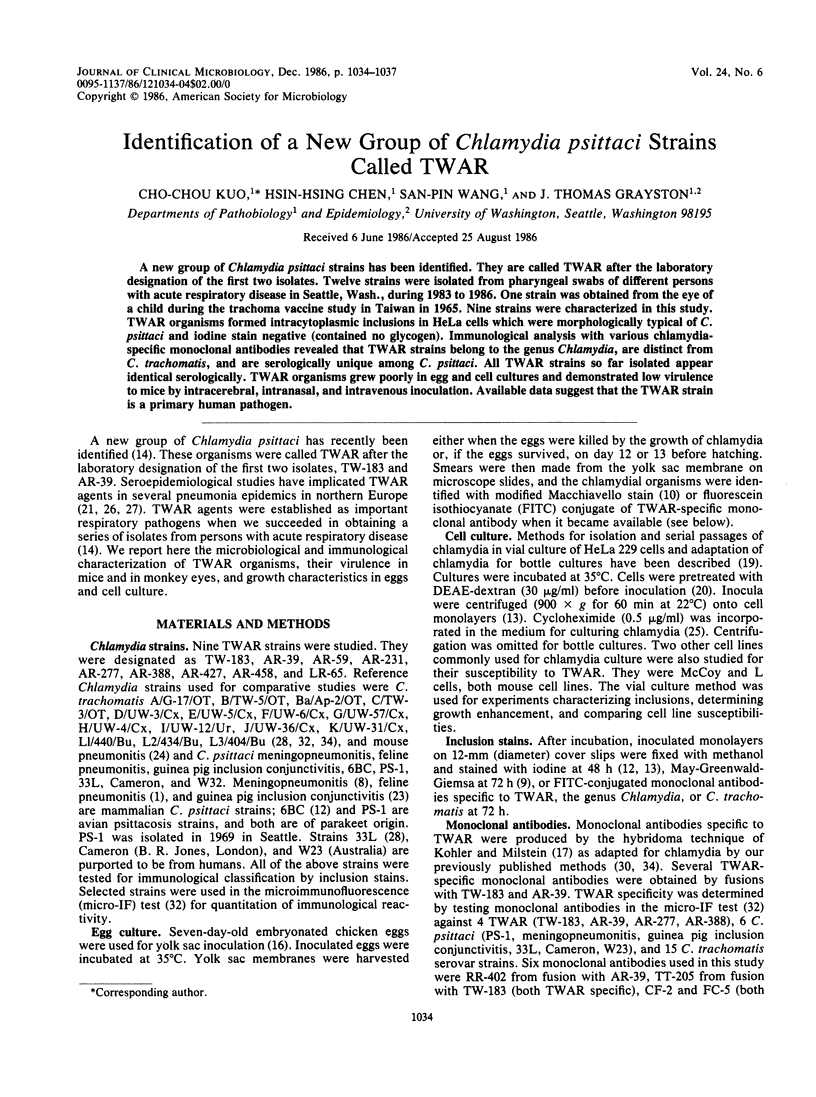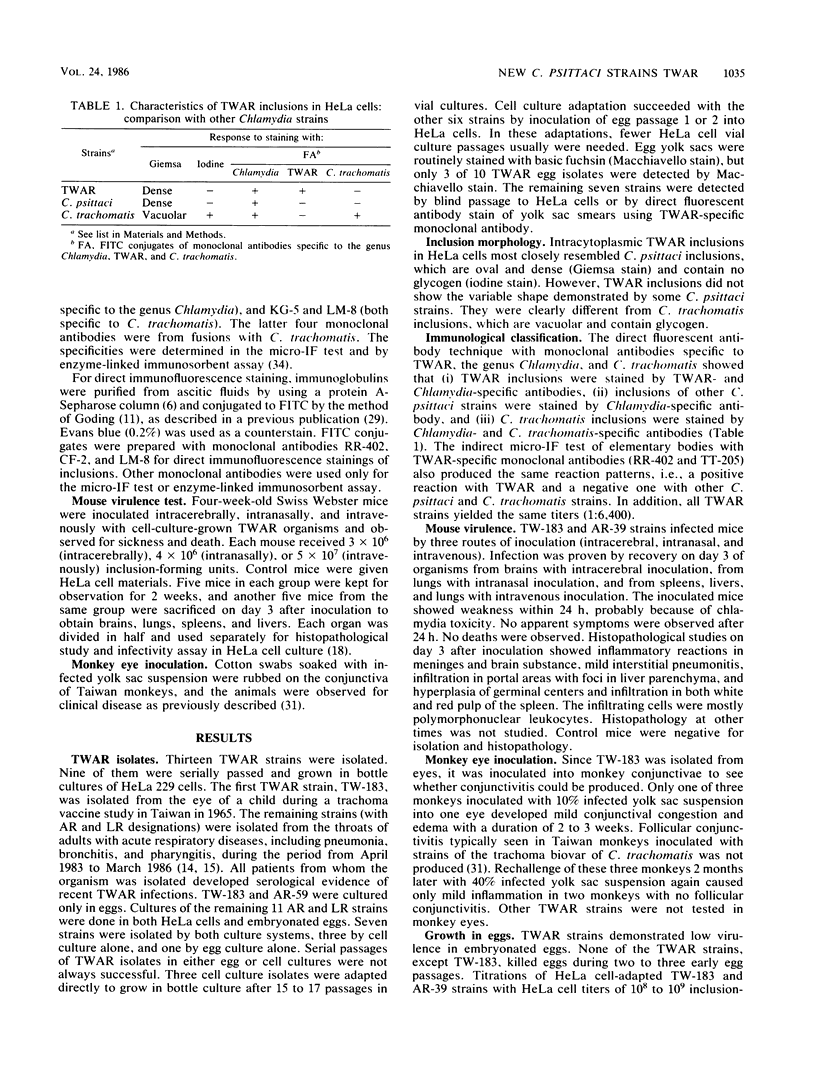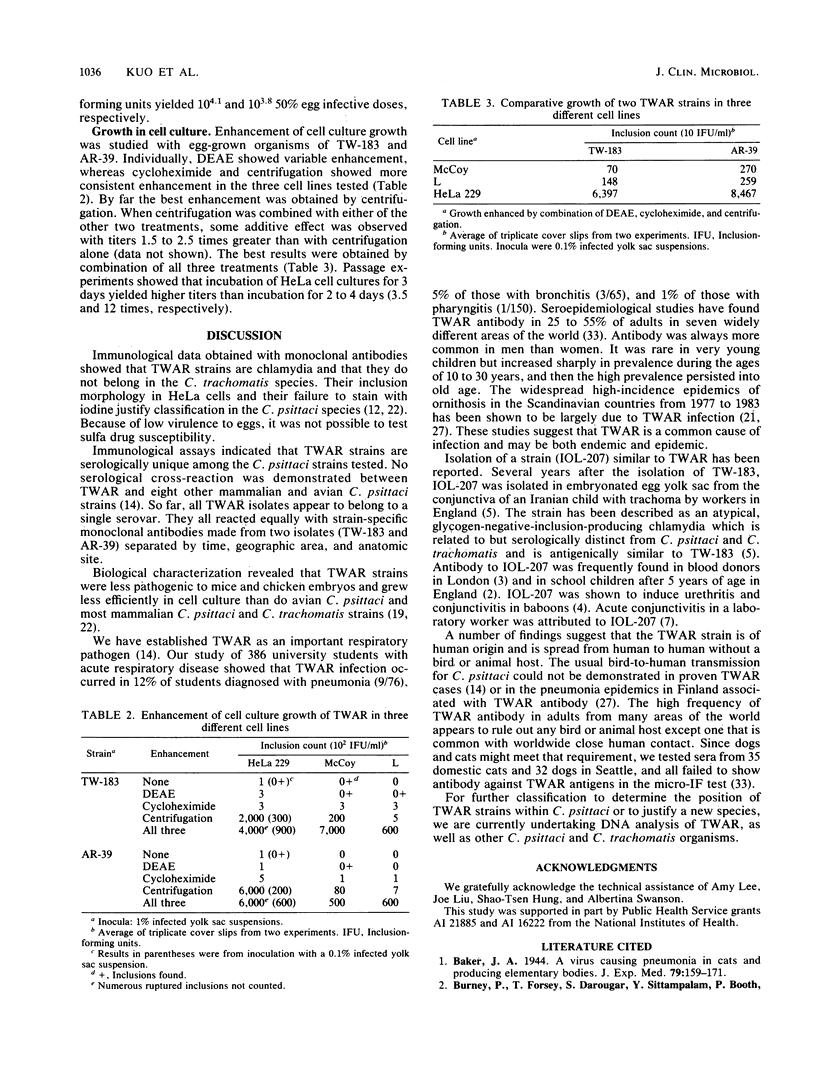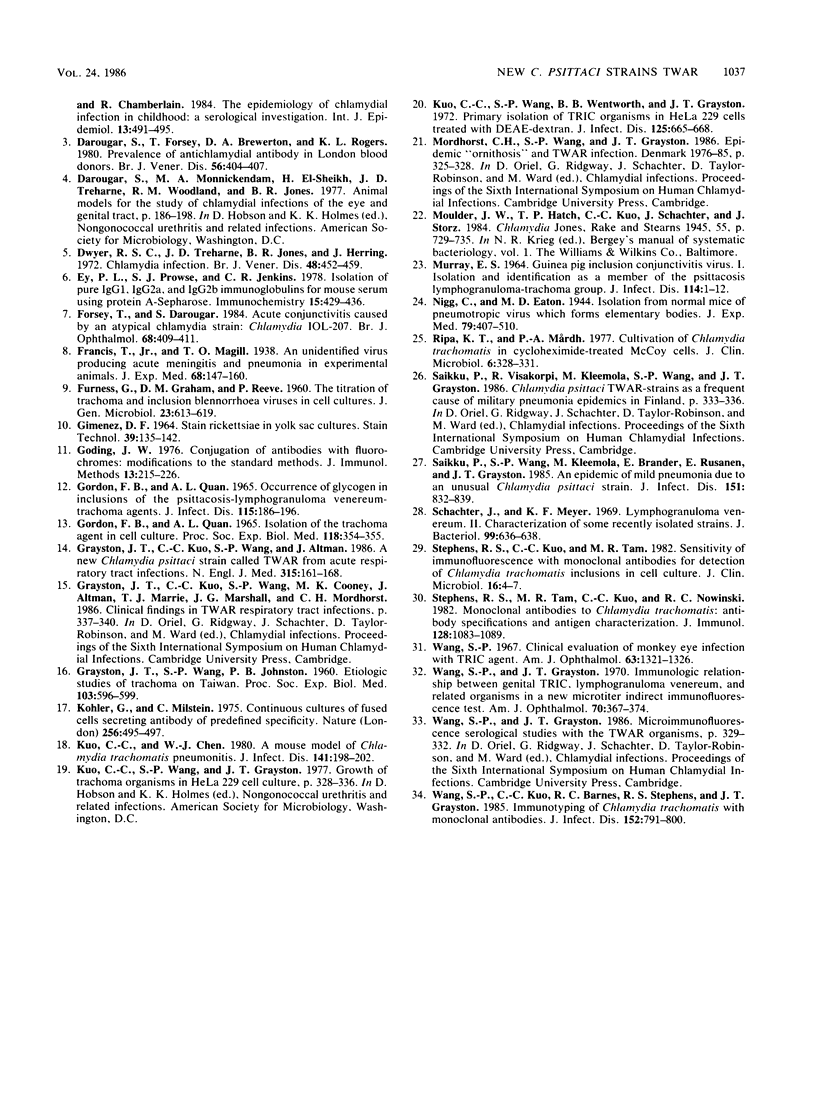Abstract
A new group of Chlamydia psittaci strains has been identified. They are called TWAR after the laboratory designation of the first two isolates. Twelve strains were isolated from pharyngeal swabs of different persons with acute respiratory disease in Seattle, Wash., during 1983 to 1986. One strain was obtained from the eye of a child during the trachoma vaccine study in Taiwan in 1965. Nine strains were characterized in this study. TWAR organisms formed intracytoplasmic inclusions in HeLa cells which were morphologically typical of C. psittaci and iodine stain negative (contained no glycogen). Immunological analysis with various chlamydia-specific monoclonal antibodies revealed that TWAR strains belong to the genus Chlamydia, are distinct from C. trachomatis, and are serologically unique among C. psittaci. All TWAR strains so far isolated appear identical serologically. TWAR organisms grew poorly in egg and cell cultures and demonstrated low virulence to mice by intracerebral, intranasal, and intravenous inoculation. Available data suggest that the TWAR strain is a primary human pathogen.
Full text
PDF



Selected References
These references are in PubMed. This may not be the complete list of references from this article.
- Burney P., Forsey T., Darougar S., Sittampalam Y., Booth P., Chamberlain R. The epidemiology of chlamydial infections in childhood: a serological investigation. Int J Epidemiol. 1984 Dec;13(4):491–495. doi: 10.1093/ije/13.4.491. [DOI] [PubMed] [Google Scholar]
- Darougar S., Forsey T., Brewerton D. A., Rogers K. L. Prevalence of antichlamydial antibody in London blood donors. Br J Vener Dis. 1980 Dec;56(6):404–407. doi: 10.1136/sti.56.6.404. [DOI] [PMC free article] [PubMed] [Google Scholar]
- Dwyer R. S., Treharne J. D., Jones B. R., Herring J. Chlamydial infection. Results of micro-immunofluorescence tests for the detection of type-specific antibody in certain chlamydial infections. Br J Vener Dis. 1972 Dec;48(6):452–459. doi: 10.1136/sti.48.6.452. [DOI] [PMC free article] [PubMed] [Google Scholar]
- Ey P. L., Prowse S. J., Jenkin C. R. Isolation of pure IgG1, IgG2a and IgG2b immunoglobulins from mouse serum using protein A-sepharose. Immunochemistry. 1978 Jul;15(7):429–436. doi: 10.1016/0161-5890(78)90070-6. [DOI] [PubMed] [Google Scholar]
- FURNESS G., GRAHAM D. M., REEVE P. The titration of trachoma and inclusion blennorrhoea viruses in cell cultures. J Gen Microbiol. 1960 Dec;23:613–619. doi: 10.1099/00221287-23-3-613. [DOI] [PubMed] [Google Scholar]
- Forsey T., Darougar S. Acute conjunctivitis caused by an atypical chlamydial strain: Chlamydia IOL 207. Br J Ophthalmol. 1984 Jun;68(6):409–411. doi: 10.1136/bjo.68.6.409. [DOI] [PMC free article] [PubMed] [Google Scholar]
- GIMENEZ D. F. STAINING RICKETTSIAE IN YOLK-SAC CULTURES. Stain Technol. 1964 May;39:135–140. doi: 10.3109/10520296409061219. [DOI] [PubMed] [Google Scholar]
- GORDON F. B., QUAN A. L. ISOLATION OF THE TRACHOMA AGENT IN CELL CULTURE. Proc Soc Exp Biol Med. 1965 Feb;118:354–359. doi: 10.3181/00379727-118-29841. [DOI] [PubMed] [Google Scholar]
- GORDON F. B., QUAN A. L. OCCURENCE OF GLYCOGEN IN INCLUSIONS OF THE PSITTACOSIS-LYMPHOGRANULOMA VENEREUM-TRACHOMA AGENTS. J Infect Dis. 1965 Apr;115:186–196. doi: 10.1093/infdis/115.2.186. [DOI] [PubMed] [Google Scholar]
- GRAYSTON J. T., WANG S. P., JOHNSTON P. B. Etiologic studies of trachoma on Taiwan. Proc Soc Exp Biol Med. 1960 Mar;103:596–599. doi: 10.3181/00379727-103-25607. [DOI] [PubMed] [Google Scholar]
- Goding J. W. Conjugation of antibodies with fluorochromes: modifications to the standard methods. J Immunol Methods. 1976;13(3-4):215–226. doi: 10.1016/0022-1759(76)90068-5. [DOI] [PubMed] [Google Scholar]
- Grayston J. T., Kuo C. C., Wang S. P., Altman J. A new Chlamydia psittaci strain, TWAR, isolated in acute respiratory tract infections. N Engl J Med. 1986 Jul 17;315(3):161–168. doi: 10.1056/NEJM198607173150305. [DOI] [PubMed] [Google Scholar]
- Kuo C., Chen W. J. A mouse model of Chlamydia trachomatis pneumonitis. J Infect Dis. 1980 Feb;141(2):198–202. doi: 10.1093/infdis/141.2.198. [DOI] [PubMed] [Google Scholar]
- Kuo C., Wang S., Wentworth B. B., Grayston J. T. Primary isolation of TRIC organisms in HeLa 229 cells treated with DEAE-dextran. J Infect Dis. 1972 Jun;125(6):665–668. doi: 10.1093/infdis/125.6.665. [DOI] [PubMed] [Google Scholar]
- Köhler G., Milstein C. Continuous cultures of fused cells secreting antibody of predefined specificity. Nature. 1975 Aug 7;256(5517):495–497. doi: 10.1038/256495a0. [DOI] [PubMed] [Google Scholar]
- MURRAY E. S. GUINEA PIG INCLUSION CONJUNCTIVITIS VIRUS. I. ISOLATION AND IDENTIFICATION AS A MEMBER OF THE PSITTACOSIS-LYMPHOGRANULOMA-TRACHOMA GROUP. J Infect Dis. 1964 Feb;114:1–12. doi: 10.1093/infdis/114.1.1. [DOI] [PubMed] [Google Scholar]
- Ripa K. T., Mårdh P. A. Cultivation of Chlamydia trachomatis in cycloheximide-treated mccoy cells. J Clin Microbiol. 1977 Oct;6(4):328–331. doi: 10.1128/jcm.6.4.328-331.1977. [DOI] [PMC free article] [PubMed] [Google Scholar]
- Saikku P., Wang S. P., Kleemola M., Brander E., Rusanen E., Grayston J. T. An epidemic of mild pneumonia due to an unusual strain of Chlamydia psittaci. J Infect Dis. 1985 May;151(5):832–839. doi: 10.1093/infdis/151.5.832. [DOI] [PubMed] [Google Scholar]
- Schachter J., Meyer K. F. Lymphogranuloma venereum. II. Characterization of some recently isolated strains. J Bacteriol. 1969 Sep;99(3):636–638. doi: 10.1128/jb.99.3.636-638.1969. [DOI] [PMC free article] [PubMed] [Google Scholar]
- Stephens R. S., Kuo C. C., Tam M. R. Sensitivity of immunofluorescence with monoclonal antibodies for detection of Chlamydia trachomatis inclusions in cell culture. J Clin Microbiol. 1982 Jul;16(1):4–7. doi: 10.1128/jcm.16.1.4-7.1982. [DOI] [PMC free article] [PubMed] [Google Scholar]
- Stephens R. S., Tam M. R., Kuo C. C., Nowinski R. C. Monoclonal antibodies to Chlamydia trachomatis: antibody specificities and antigen characterization. J Immunol. 1982 Mar;128(3):1083–1089. [PubMed] [Google Scholar]
- Wang S. P. Clinical evaluation of monkey eye infection with TRIC agent. A numerical scoring system of disease severity. Am J Ophthalmol. 1967 May;63(5 Suppl):1321–1326. doi: 10.1016/0002-9394(67)94119-0. [DOI] [PubMed] [Google Scholar]
- Wang S. P., Grayston J. T. Immunologic relationship between genital TRIC, lymphogranuloma venereum, and related organisms in a new microtiter indirect immunofluorescence test. Am J Ophthalmol. 1970 Sep;70(3):367–374. doi: 10.1016/0002-9394(70)90096-6. [DOI] [PubMed] [Google Scholar]
- Wang S. P., Kuo C. C., Barnes R. C., Stephens R. S., Grayston J. T. Immunotyping of Chlamydia trachomatis with monoclonal antibodies. J Infect Dis. 1985 Oct;152(4):791–800. doi: 10.1093/infdis/152.4.791. [DOI] [PubMed] [Google Scholar]


